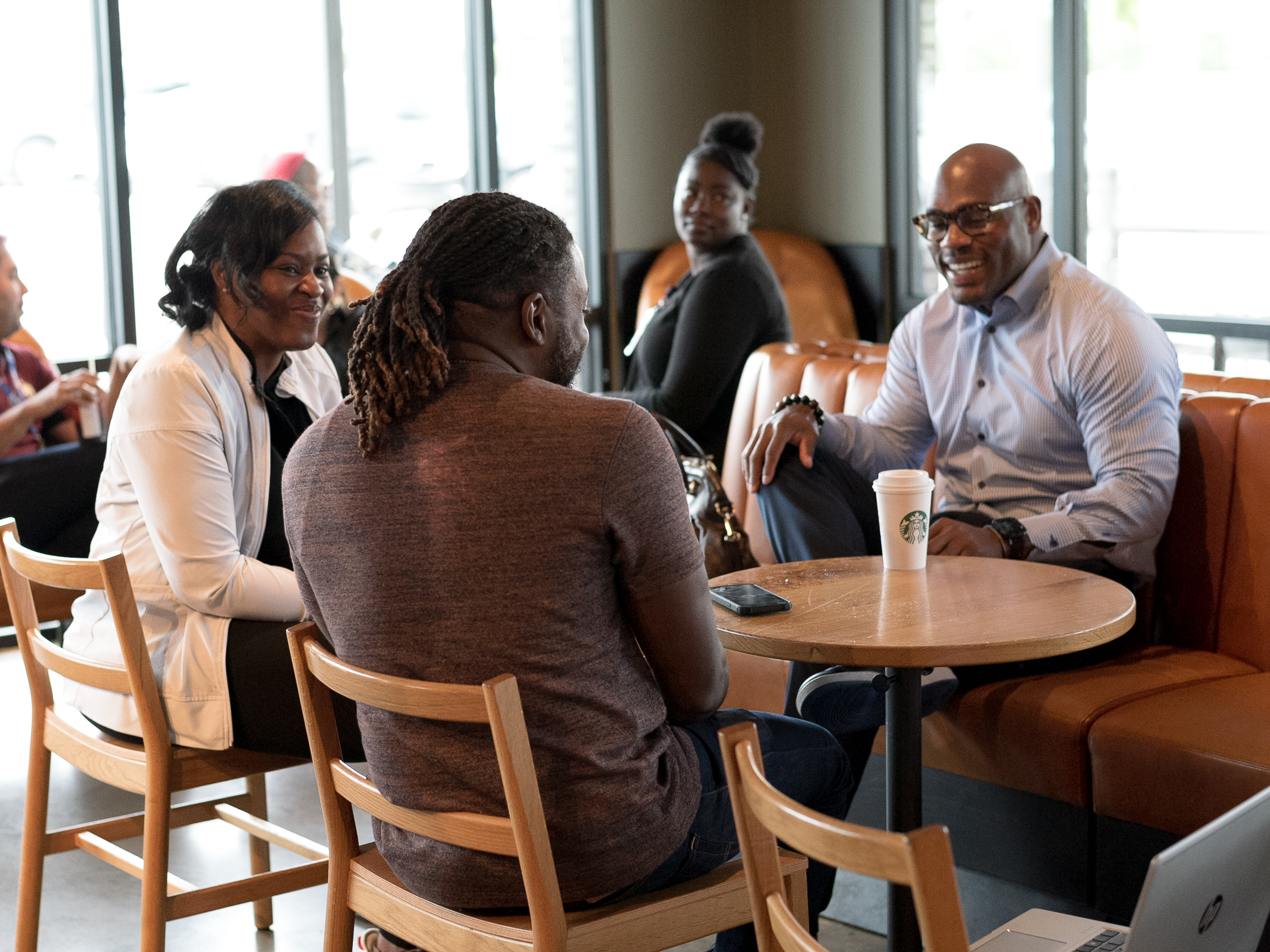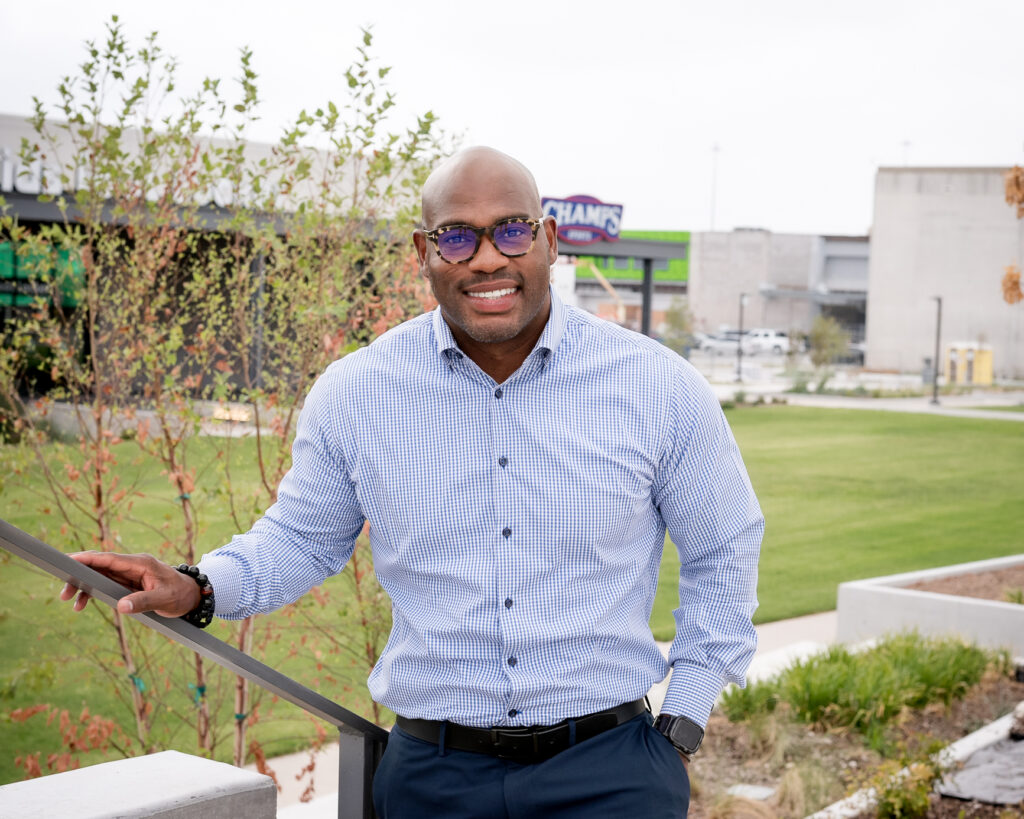Redbird's Momentum
 Photo by Conleigh Bauer
Photo by Conleigh Bauer
Columns Committee member Terry Odis, project manager at DFW Airport, sits down with Terrence Maiden and Dr. Saosat Stafford to discuss the impact of the redevelopment of Redbird Mall, which was, and remains, the only major shopping center located in the southern half of Dallas. Southern Dallas comprises 54 percent of the City of Dallas’ land mass, 40 percent of the city’s population, but only 15 percent of the tax base.
Terrence Maiden is the chief executive officer for Russell Glen, a real estate development and investment company in Dallas. He draws on more than two decades of real estate experience to lead and inspire the company’s growth. Terrence is recognized for his vision and approach to transformational real estate projects in commercial real estate development. He is currently at the forefront of the multi-award-winning Shops at RedBird (former Red Bird Mall) redevelopment in southwest Dallas.
Dr. Saosat Stafford, owner of the WOW Dental Redbird, gives her perspective on why she moved her practice to the Shops at RedBird. The dentist graduated from Baylor College of Dentistry Texas A&M Health Science Center in Dallas in 2008 and is a member of the Army National Guard, providing dental services to soldiers.
As a developer and a member of the community, how important is it to come back and contribute your experience and education to projects of this magnitude?
TM: I grew up in this area, like two miles away. To come back home and work on a project of this magnitude has been very fulfilling.
I think it’s important for several reasons. What drives my motivation is seeing the need of the area and knowing that there are options to fulfill that need. I saw it as a real, true investment opportunity but also an opportunity to create a deep impact. It’s been tough. We’ve been working on the mall for seven years. And there’s still more work to be done. But it’s been good to be a voice for the business community, the health systems and inspiring them to return and invest here in our community.
How do you convince business owners to locate their business in Redbird?
TM: There must be buy-in from leadership to say, ‘Hey, this investment is important from a corporate philosophical standpoint,’ especially when you get into diversity and inclusion, being able to create jobs in an underserved community, to provide health care. This area is considered a health care desert and grocery desert — Parkland and UT Southwestern’s recent openings will address that. We’re talking to a grocery store about fulfilling those needs, which has driven their decision-making as well, so there’s a mutual benefit. For example, the Starbucks at Redbird ranks No. 3 or 4 in all DFW. It’s a community store concept, and it’s one of around 12 in the country. The first Starbucks Community Store was opened in Ferguson, Missouri, so they’re going into Black and Brown communities. This store was built by Source Builders and designed by KAI, both minority-owned and operated architecture and construction firms.
Is it important that the community know that this Starbucks, this area is being developed, designed, and built by its own community members and minority-owned companies? If so, how do we promote that?
TM: I think we could do a better job of that. Part of what I like trying to do is really identify minority-owned businesses in the area and welcome them. Breakfast Brothers is one of the newer businesses opening at the Shops at RedBird, and we’re really excited about that.
What percentage of businesses in RedBird are minority-owned?
TM: 40% to 50%.
Are there any further plans for redevelopment?
TM: Our hope is to continue redeveloping in this area for years to come. There are 100 acres here. Seeing high-rises here is definitely feasible.


Dr. Stafford, why did you locate your practice here in Redbird?
SS: I’ve had my practice in Redbird for the last five years prior to moving into the redeveloped area. I love the area and my clients here, and I’m excited to be part of the community. Everyone loves the new office.
I feel like instead of going to Frisco or Plano, I wanted to have an office in Redbird, with a great experience in a nice space, great customer service, state-of-the-art equipment that won’t decrease in quality because we’re in Redbird. If anything, I want to stand out. I want to make sure that I have an impact in dental care and be in an area that’s thriving and growing and moving, and I feel like we have that here now.
We’ve been here the last 10 years, so even if patients show up to the old space, they can come right down the road and still make their appointment on time.
What were some of the challenges you faced as a tenant relocating into the renovated area?
SS: The buildout of the space took a bit longer than expected, but after that we were off to the races. Our buildout went fast, about five months. And I never wanted to stop providing service to our clients. So we closed on Thursday at the old location and were back up and running on Monday in our new office with new furniture and equipment.
As a developer, Terrence, what are some of the challenges you faced?
TM: Holding fast to our commitment to quality and not compromising on the level of tenants that we wanted as part of the project. Securing financing proved to be tough initially, but once we got momentum we have banks and capital guys that are very interested in financing here. We’ve been talking to a grocery store for five years now. But getting a stakeholder from thinking about it to talking about it to actually moving here is a huge challenge. We must show that we can address and mitigate their risks and concerns. But once there’s a grocery store, then you get more restaurants and other retailers eager to move in, so we’re hopeful.
In projects like this, how often does a developer have the opportunity to engage with tenants directly?
TM: With RedBird, most of the tenants are here based on relationships. Typically, we like to get involved and spend a lot of time with the tenants. Ironically, I think Dr. Stafford and I have met the least as she interfaced mostly with the brokers and mall management, but she and my wife are sorority sisters from the same college. My brother used to work at Frost Bank group, and I knew their leadership, so we convinced them to come in. I know the owner of Fuzzy’s here, and we became good friends. A lot of the major anchors like UT Southwestern, Children’s Hospital, Parkland, Chime were all relationship driven. I attend Concord Church just around the corner. A lot of those relationships are centered on trust, history, and reputation. People need to know that if they invest trust in you, that you can get it done.
Dr. Stafford, what is one thing you think the developers should know from a tenant/business owner’s perspective about this redevelopment so far?
SS: I’d like to know the long-term vision for the area, what things are important in the vision of the developers, and how we as business owners fit into that vision. What kind of input and leverage can we expect to contribute? I’d like to see the larger developers reaching out and inviting small business owners to be a part of the process, for both reassurance and knowledge. I feel like we have that here for the most part. What I’d like you to know is that this has been a great experience, so I’d like to continue to be a part of that.
Terrence, what is one thing you think the tenants and business owners should know from a developer’s perspective about this redevelopment so far?
TM: We want our entrepreneurs to know our appreciation for being willing to invest. This is a huge investment of not only capital, but of time, resources. We realize those decisions are not easy. We appreciate the entrepreneurs, business owners, and executives who are willing to take that risk.
We also want you to know that as developers we juggle a lot — design, construction, financing — and we don’t get it right all the time. The one thing we try to reassure people here is our level of commitment to making sure that this experience has been top of the line. We also want to continue to support you and make sure you’re operating well, that we can keep your environment safe to operate your business.
This interview, conducted by Terry Odis, project manager at DFW Airport, has been edited for brevity and clarity.